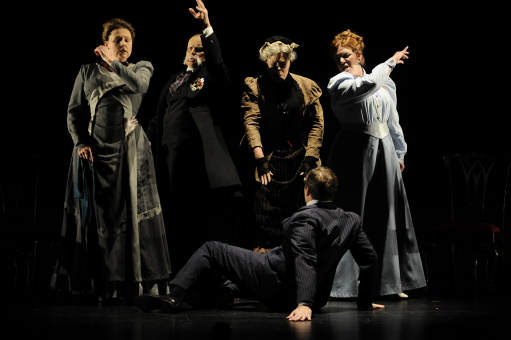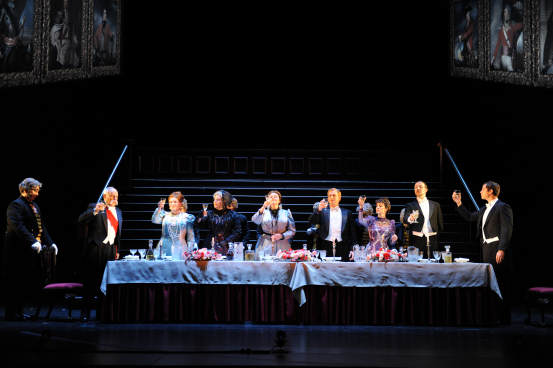Other Links
Editorial Board
-
Editor - Bill Kenny
-
Deputy Editor - Bob Briggs
Founder - Len Mullenger
Google Site Search
SEEN AND HEARD INTERNATIONAL OPERA
REVIEW
Britten, Owen Wingrave: Soloists, Chicago Children's Chorus, and Orchestra of Chicago Opera Theater, Steuart Bedford (conductor) Harris Theater, Chicago 22.5.2009 (JLZ)
Benjamin Britten (1913-1976) has been an important part of the repertoire of Chicago Opera Theater
for some time and the current season's inclusion of the composer's penultimate opera, Owen Wingrave, brings to its stage an excellent production of this work. Originally composed in response to a commission from the BBC for a television opera, Owen Wingrave is removed from its original conception
as a film through being
presented as a live performance,
with a chamber orchestra reduction by the British composer David Matthews in lieu of the original scoring
for recording in a television studio.
(Britten himself also envisioned
the piece as a chamber opera,
according to the programme notes.) While Owen Wingrave is available on DVD in various formats, it takes a staged performance
like this to bring the score to life through engagement
with the audience. In this particular instance, Chicago Opera Theater deserves congratulations for its uniformly excellent cast, seamless production, and extraordinarily effective stage direction.
In this fine production, baritone Matthew Worth stands out for his committed and convincing portrayal of Owen Wingrave
himself. This young singer personified the title character from the opening of scene through
to the opera's conclusion. Not only did he sing the role well, but his stage presence and
his body language contributed to
his aural characterization at every turn. His diction was notable for
its clarity in the solo passages as well as those in which other characters' lines intersect with his. In a work like this, which includes extended declamatory sections,
Worth's approach was ideal
for conveying the whole text
- the sense of what is being said as well as the words themselves. Worth's voice, which has a nice, polished timbre throughout,
was particularly suited to the lyrical passages. He
was particularly effective work in the opening scene
at Spencer Coyle's military school in London's Bayswater district, which
requires immediate projection of the dramatic situation.
Emotional conflict is apparent at once; Wingrave expresses his intention not to pursue
his family's tradition of an
army career while Coyle
sees great military potential in
his student.
Cast:
Owen Wingrave: Matthew Worth
Spencer Coyle: Matt Boehler
Lechmere: Brian Anderson
Miss Wingrave: Mary Jane Johnson
Mrs. Coyle: Rebecca Caine
Mrs. Julian: Brenda Harris
Kate Julian: Jennifer Johnson
Gen. Sir Philip Wingrave: Robin Leggate/a>
Production:
Conductor: Steuart Bedford
Director: Ken Cazan
Set Designer: Peter Harrison
Costume Designer: Jacqueline Saint Anne
Lighting Designer: Keith Parham

Completed in 1970 and first broadcast in 1971, Owen Wingrave is based on the short story of the same name by Henry James, with
a libretto by Myfanwy Piper. Piper's libretto is closer the the text of the short story James published in 1892 than the author's dramatic version of the work as The Saloon, which he completed in 1908.
With its pacifist theme - the challenge of pursuing peace in a militarist culture
- the opera is in a sense the product of its time, when opposition to the Vietnam War found voice in various media. In this case, Britten's response is an elegant one, which endures beyond the editorials, rallies, marches, and sit-ins of the day. Yet it is also an opera which betrays other influences, including the choice of source material
from Henry James, a source that Britten had
also used in his earlier opera, The Turn of the Screw.
Additionally, the title character Owen Wingrave resembles
the castigated hero Billy Budd in Britten's opera of the same
name. Other influences are also evident, with Britten's use of orchestral interludes between vocal scenes calling to mind
both Peter Grimes and Alban Berg's Wozzeck, which
shares with Owen Wingrave the twelve-tone approach
to composition that each composer had taken.
Lastly, Owen Wingrave
was designed as a television opera, exactly like the groundbreaking Amahl and the Night Visitors by Giancarlo Menotti.
These influences set a helpful context for hearing Owen Wingrave, which is a
very challenging work, perhaps even
because of its complex origins.

As Coyle, Matt Boehler was also very effective.
With a lighter sound than Worth's,
though the character was originally cast for a bass-baritone, Boehler
brought a fine touch to the role as a sympathetic, rather than antagonistic mentor. He not only worked well with
Matthew Worth, but also with Rebecca Caine, who portrayed
his character's wife. As a kind of foil for the women at Paramore, the Wingrave
family estate, Mrs. Coyle expresses sometimes
contrary reactions to the situation
surrounding Owen, and Caine brought great sensitivity to those passages. As Kate Julian, daughter of
the widowed Mrs. Julian, a family friend
of the Wingraves, Jennifer Johnson was quite moving, particularly in scene before the tragic climax of the opera
in which Owen is found dead after sleeping in a haunted room. Her
emotional intensity - everyone
hopes she will marry Owen but she declares him a coward after his refusal to
join the army - was apparent throughout her entire register and especially in the lower notes. Her portrayal brought
real dimensionality to a character who is less delineated in Henry James's short story. The tension between Worth's Owen and Johnson's Kate was palpable, and led the audience
convincingly into the finale. Kate's
genuine remorse at having forced Owen to sleep in the doomed chamber contributed
a sense of loss to the ending, which would otherwise have been the monochromatic. Yet even
at the conclusion, Worth's persona as Owen hovered
around the stage, like the ghosts of his
forebears evoked and depicted at various points in the
opera. The actors who portrayed the ancient Wingraves
added to the opera through their silent presence, while the Chicago Children's Chorus was nicely prominent, although unseen, in the second act.
The production itself made the opera work well on stage using
minimal sets and efficient scene changes. In fact, the somewhat spare sets fit the production
very well, so that the audience could concentrate on the
dramatic focus of each of the scenes.
The set also allowed the performers to move easily on stage as they interacted with each other and responded to the
theatrical blocking plan. More than that, the design neatly
matched Britten's intention for the
work to become a staged chamber-ensemble
piece as well as a TV opera, by bringing out the conversational structure of the work. This, in turn, enhanced the outstanding performances by the entire cast, which emerged well in the ensembles,
that punctuate the opera. The
united condemnation of Owen by the family at Paramore was especially poignant as they literally cast the young man down.
This production also deserves praise for
its engagement of Steuart Bedford as conductor, since
he led the premiere of the work for television. His
intimate knowledge of the score was
always apparent in elegant approach to the orchestra, which emerged more prominently when necessary
while balancing the voices nicely in the dramatic scenes. His tempos
matched the text exactly, so that the libretto benefited
enormously from appropriately
emphasised enunciation. The sense of authenticity
and his engagement of the score was self-evident throughout the
whole performance. As relevant as this production is at a time when
apparently ceaseless wars and conflicts may be found around the globe, the message of the work is timeless
- declarations of committed pacificism can still be courageous actions
especially in the face of violent opposition. Any
one interested in this message and others simply
interested in Britten's music will find this Owen Wingrave
an excellent production.
James L Zychowicz
Pictures ©
Chicago Opera Theater
Back
to Top
Cumulative Index Page
